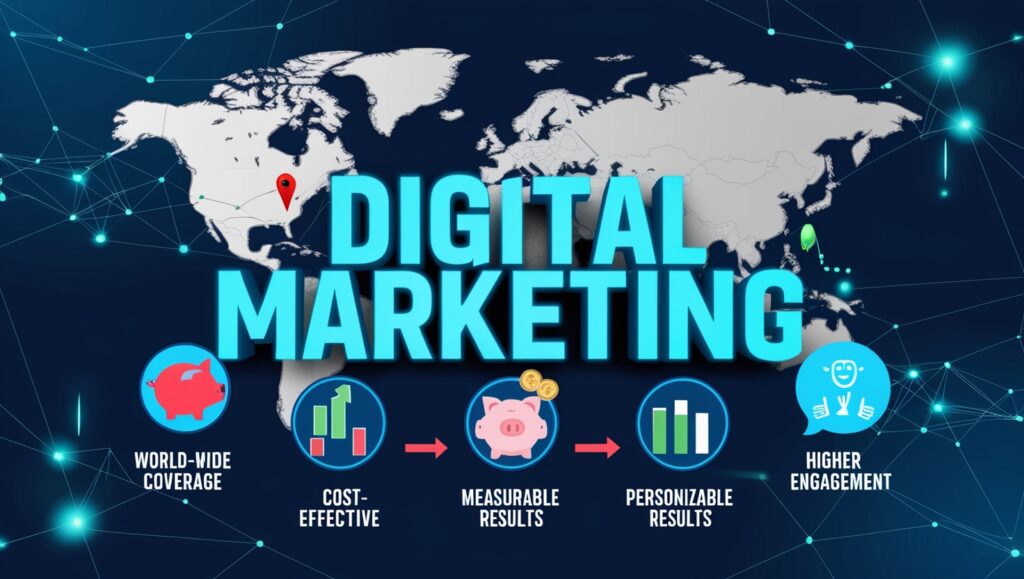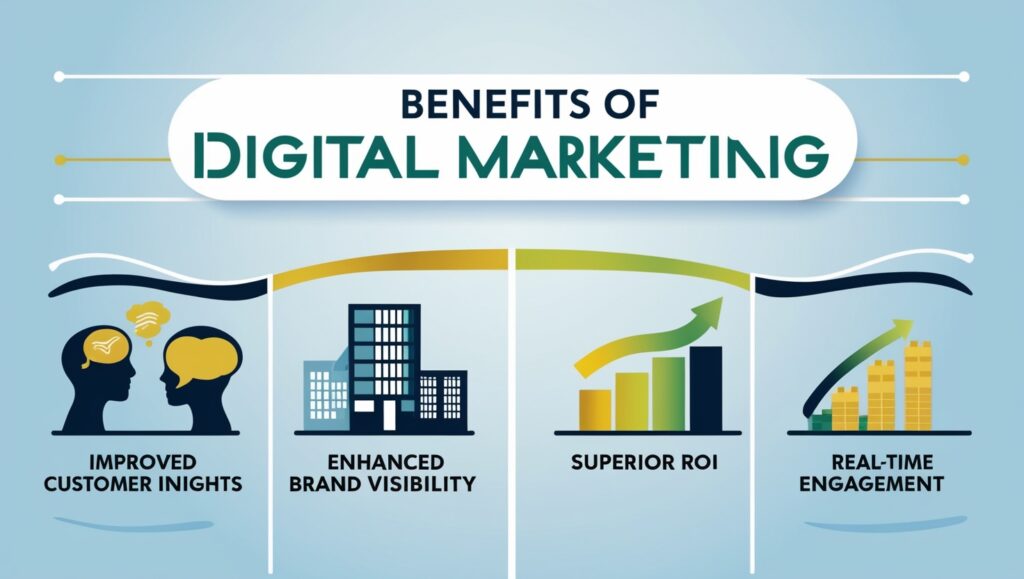Digital Marketing: The Weapon for Modern Businesses
Introduction
In today’s digital age, businesses of all sizes are leveraging the power of digital marketing to reach and engage their target audiences. In contrast to traditional marketing, which is mainly done through print media, TV, and radio, digital marketing uses online channels to connect with potential customers. This is a comprehensive guide that covers everything you need to know about digital marketing, from its importance and strategies to its tools and how it can change your business.

What is Digital Marketing ?
Digital marketing means promoting business offerings using various channels of digital marketing such as search engines, social media platforms, email, web pages, or mobile applications. Its key function is to ensure that there’s a connection between businesses and the target audiences that can be effectively measured in minimal costs. Businesses can design bespoke, relevant advertising campaigns through various digital media to achieve exceptional output.
Importance of Digital Marketing

- World-Wide Coverage
Digital marketing makes it possible for businesses to reach audiences all over the world. Using Google Ads and social media, you can target users from any location; this breaks geographical barriers. This is a surety that even the smallest business will have a global presence. - Cost-Effective
Compared to the traditional methods of marketing, digital marketing is more cost-effective. Small businesses can compete with big companies through tools such as social media marketing and email campaigns, which have minimal investment but give maximum returns. - Measurable Results
Digital marketing is also measurable. This means its performance can be tracked in real-time, measuring metrics of website traffic, conversion rates, and return on investment through analytics tools. It ensures businesses make informed decisions to opt for the best strategy. - Personalization
Digital marketing allows you to offer highly customized experiences for users, considering their preferences, demographics, and online behavior. The more personalized experience helps you form stronger bonds with customers and encourages loyalty. - Higher Engagement
Businesses can now interact directly with their audiences on platforms like Instagram, Facebook, and YouTube by posting comments, likes, and shares. Such interactions form better relationships with users. Interactive content such as polls, quizzes, and live streams increase user engagement.
Key Components of Digital Marketing
Search Engine Optimization is the process of making your website more search-engine-friendly. Due to higher rankings, it boosts visibility and organic traffic. Good SEO strategies focus on delivering a seamless user experience and providing relevant content.
- Key Aspects of SEO:
- Keyword research: Identifying which words and phrases your audience is searching for.
- On-page SEO: Optimize meta tags, headings and content.
- Off-page SEO: Acquiring quality backlinks to enhance domain authority.
- Technical SEO: Making sure your website is fast, mobile-friendly, and secure.
- Content Marketing
Content marketing is a method of creating and distributing valuable, relevant, and consistent content to attract and retain a clearly defined audience. Quality content does not only improve your SEO rankings but also establishes your brand as an industry authority.
- Examples of Content:
- Blogs and articles
- Infographics
- Videos and podcasts
- E-books and whitepapers
- Social Media Marketing (SMM)
Social media marketing means using applications like Facebook, Instagram, LinkedIn, and Twitter to communicate your brand, product, or service. It’s a powerful avenue to connect with your audience and build loyalty to your brand.
- Methods:
- Publishing engaging, shareable content.
- Running targeted ad campaigns.
- Collaboration with influencers to amplify reach.
- Email Marketing
A popular tool for nurturing leads and continuing customer relationships through email marketing involves sending newsletters, promotional offers, and personalized messages to keep them informed and active.
- Best Practices:
- Segment the email list on the basis of user behavior and preferences.
- Write catchy subject lines to increase the open rate of emails.
- Keep clear calls-to-action (CTAs) within the emails.
- PPC Advertising
PPC is a cost-per-click pay-for-performance marketing model where for each ad click, an advertiser pays a fee. Among popular PPC platforms are Google Ads and Facebook Ads-they tend to accelerate traffic and lead flow.
- Main Advantages:
- Immediacy.
- Targeted campaigns.
- Flexible budget options.
- Affiliate Marketing
This is a technique of collaborating with affiliates who would market your product or service for a commission generated on every sale. It has proven to be a very successful method of growing your business while increasing sales.
- Mobile Marketing
Due to the rapidly increasing use of smartphones, mobile marketing targets a population through text messages, applications, and web pages optimized for mobile devices. Push notifications and in-app advertising are integral components of this technique.
- Web Analytics
Analytics tools like Google Analytics provide insights into user behavior, helping businesses optimize their strategies for better results. By analyzing data, marketers can identify trends and areas for improvement.
Benefits of Digital Marketing for Businesses

- Improved Customer Insights
Digital tools help businesses understand their customers better through data analysis and tracking. This enables more effective targeting and campaign optimization. - Enhanced Brand Visibility
The continued presence online throughout social media will assist in establishing brand recognition and credibility. Great content and positive customer experiences help build your brand’s reputation stronger. - Superior ROI
Digital marketing campaigns yield measurable returns, which means that budgets can be allocated appropriately. Businesses can pinpoint which strategies work best and put their resources into those areas. - Scalability
The beauty of digital marketing strategies is that they can be scaled to suit all businesses, whether startups or multinational corporations. With a growing business, you can increase the scale of your campaigns to reach wider audiences. - Real-Time Engagement
Direct engagement with customers will earn you their trust and loyalty. Directly responding to comments, messages, and reviews lets people know you appreciate your audience’s feedback.
Popular Tools in Digital Marketing
- Google Analytics: Used for monitoring the performance of your website and its users.
- SEMrush and Ahrefs: SEO and keyword research.
- Hootsuite: To manage the social media campaign and post scheduling.
- Mailchimp: For email marketing automation.
- Canva: To create beautiful graphics and social media posts.
- Google Ads: To run the PPC campaigns and drive traffic.
How to Create a Winning Digital Marketing Strategy
- Define Your Goals
Clearly define your goals-if it’s brand awareness, lead generation, or sales. Define SMART goals for setting them so that they are Specific, Measurable, Achievable, Relevant, and Time-bound. - Understand Your Target Audience
Know the demographic, preferences, and pain points of your audience so you can create campaigns that will resonate with them. Tools available to gather such information include surveying and social media insights. - Select the Right Channels
Focus on systems that resonate with your audience’s culture and interests. For example, LinkedIn would be perfect for B2B marketing, whereas Instagram is ideal when using high-perceived value content. - Develop Quality Content
Create compelling and relevant content for your audience’s needs. In doing so, ensure that the entire content can fit the brand voice and relate to the issues customers face. - Monitor and Optimize
Use analytics tools to track performance and adjust your strategies for better outcomes. Continuous optimization is key to staying ahead in the competitive digital landscape.
Trends in Digital Marketing
- AI and Automation
Tools like chatbots and automated email sequences are enhancing efficiency and personalization. AI-powered tools analyze data and predict user behavior, enabling smarter marketing decisions. - Voice Search Optimization
The advent of voice assistants like Alexa and Google Assistant is making optimizing content for voice search more relevant. Use more conversational keywords and natural language. - Video Marketing
YouTube, TikTok, and Instagram Reels are some of the current leaders in the world of digital marketing. Videos are engaging, shareable, and very good at delivering long, complex messages. - Interactive Content
Polls, quizzes, and interactive videos make users spend more time and increase interaction with your content more effectively. - Personalization
Consumerism has reached the point where personalized experiences are considered the norm. Personalization brings more engagement, loyalty, and conversions.
Difficulties of Digital Marketing
- High Competition
To stand out in a cluttered digital environment, one must be innovative and consistent. Firms need to change with each trend and changing preference of consumers. - Ad Blockers
The users use many ad blockers. It decreases the visibility of the paid campaigns. One needs to produce non-intrusive and value-based ads in order to face this challenge. - Fast Changes
Staying updated is challenging, especially with the pace of trends and algorithms. Frequent training and updated knowledge are mandatory for success.
Data Privacy - Data Privacy Concerns
Adherence to regulations such as GDPR is fundamental to maintaining consumers’ trust in a business. Transparency and appropriate data handling would be the best practices for every business.
Conclusion
Digital marketing is a vital element for thriving businesses in this modern world. With appropriate strategies, tools, and channels, businesses can become more connected with their audiences and thus accomplish their respective goals. Challenges in the field are inevitable, but being well-informed and versatile may pave the way for great triumphs. Whether small startup or large-scale enterprise, digital marketing will boost your business cycle.









